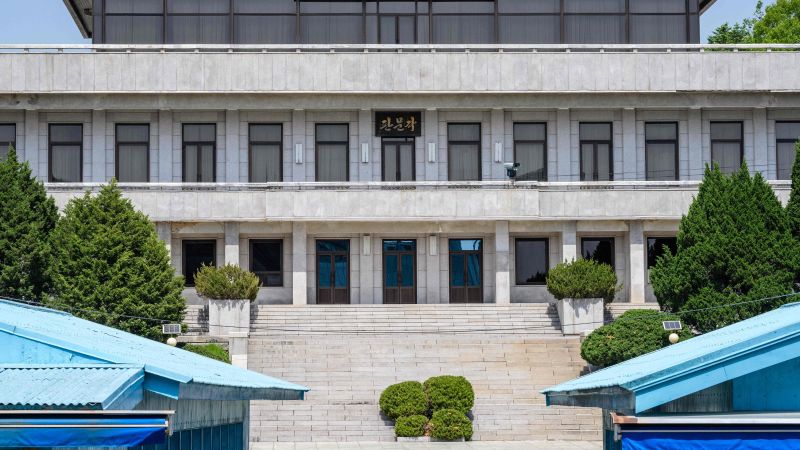US Army Soldier Identified After Crossing into North Korea
The US Army has identified the soldier who crossed into North Korea as Pvt. Travis King, a cavalry scout who joined the military in January 2021. King was set to be administratively separated from the US Army after facing disciplinary action for assault. He had been on a Joint Security Area (JSA) tour as a civilian when he crossed into North Korea without authorization.
Efforts to Resolve the Incident
US Forces Korea spokesperson Col. Isaac Taylor stated that they believe King is currently in North Korean custody and are working with their Korean People’s Army counterparts to resolve the incident. However, there is no indication that King was attempting to defect, according to a separate US official.
Detention and Status of Forces Agreement
King had spent 50 days in a detention facility in South Korea after facing disciplinary action for assault. He was held in a designated detention facility under the Status of Forces Agreement with South Korea, which outlines how US service members are treated and processed in a foreign country. The agreement states that pre-trial confinement can be at a US facility, but post-trial confinement is in a South Korean prison.
Administrative Separation and Military Assignments
Following his detention, King was set to be administratively separated from the US Army. At the time of his rotation in South Korea, he was assigned to the 6th Squadron, 1st Cavalry Regiment, 1st Brigade Combat Team, 1st Armored Division out of Fort Bliss, Texas. Currently, King is administratively attached to 1st Battalion, 12th Infantry Regiment, 2nd Brigade Combat Team, 4th Infantry Division.
Military Awards and Concern for Soldier’s Welfare
King has no deployments on his record, and his military awards include routine decorations for his rank and experience. Defense Secretary Lloyd Austin expressed his concern for the soldier’s welfare, emphasizing that it is a top priority.
Read the full article on CNN for more details.US Soldier Held in North Korea: Updates and Investigation Underway
The recent news of a US soldier being held in North Korean military custody has sent shockwaves through the international community. As tensions continue to rise on the Korean Peninsula, the situation is being closely monitored and investigated.
State Department Takes the Lead
The State Department has taken the lead in addressing this incident. According to spokesperson Matt Miller, they have not yet reached out to the North Koreans or any other governments involved. However, they are in close coordination with relevant parties and are prepared to take necessary steps.
A Voluntary Crossing?
Reports suggest that the soldier may have crossed the Military Demarcation Line into North Korea voluntarily. While US officials are waiting to confirm his identity, they are prioritizing the notification of his next of kin.
The Joint Security Area: A Symbol of Tensions
The Joint Security Area (JSA) where the incident occurred is a significant location within the Demilitarized Zone between North and South Korea. It has become a symbol of the ongoing diplomatic and military tensions in the region.
The Uncertainty of the Situation
The United Nations Command (UNC) has stated that they believe the soldier is currently in North Korean custody. However, further details about his condition and the circumstances surrounding his crossing remain uncertain.
The Unique Nature of the JSA
Unlike other parts of the heavily fortified border, crossing the Military Demarcation Line at the JSA does not require passing physical barriers. Former US President Donald Trump famously took just one step across the small raised line during his meeting with North Korean leader Kim Jong Un in 2019.
The Broader Demilitarized Zone
The broader Demilitarized Zone (DMZ) serves as a buffer between North and South Korea. Stretching 160 miles long and 2.5 miles wide, it is one of the most heavily fortified borders in the world. The area is lined with barbed wire, landmines, and patrolled by soldiers from both sides.
Stay Tuned for Updates
As the investigation unfolds and efforts are made to resolve the situation, it is crucial to stay informed about the developments. The international community will be closely watching for updates on the US soldier held in North Korea.Discover the Fascinating History of the Korean DMZ and JSA
Have you ever wondered about the history behind the Korean Demilitarized Zone (DMZ) and the Joint Security Area (JSA)? These areas hold a significant place in the world’s history, and their stories are both intriguing and captivating. Let’s dive into the details and explore the rich past of these iconic locations.
A Frozen Moment in History
The DMZ stands as a monument to the moment history froze at the end of the Korean War, which took place from 1950 to 1953. It serves as a reminder of the division between North and South Korea, with a buffer zone created to separate the two sides. This deal, signed at the village of Panmunjom, gave birth to the JSA, the only area along the DMZ where negotiations and prisoner swaps could take place.
A Stage for Tense Encounters
Over the decades, the JSA has witnessed sporadic bouts of violence between the two sides. In 1976, two US soldiers were tragically bludgeoned to death by their North Korean counterparts while attempting to trim a tree on the border. The JSA has also been the backdrop for numerous defection attempts, some successful and others not.
Strategic Significance
Under the leadership of Kim Jong Un, North Korea has been conducting tests of potentially nuclear-capable intercontinental ballistic missiles. This has raised concerns for South Korea and its treaty ally, the United States, who are determined to push back against these actions. The recent crossing of the border by a US national holds immense symbolic value in this ongoing struggle.
A Moment of Symbolism
Coinciding with the border crossing, another moment of historic and strategic symbolism unfolded at the South Korean port of Busan. For the first time since the early 1980s, a nuclear-capable US submarine made a port call. This event occurred during the inaugural meeting of the Nuclear Consultative Group (NCG) in Seoul, where Kurt Campbell, coordinator for the Indo-Pacific at the US National Security Council, was present.
A Joint Effort for Peace
The NCG is a joint US and South Korean panel established by the leaders of both countries during a summit in Washington. This panel aims to address nuclear concerns and work towards a peaceful resolution. The “Washington Declaration” unveiled during the summit outlines a set of measures designed to foster cooperation and stability in the region.
Uncover the Untold Stories
The DMZ and JSA hold countless untold stories of bravery, tension, and diplomacy. By exploring their history, we gain a deeper understanding of the complex dynamics at play in the Korean Peninsula. Join us as we delve into these captivating narratives and uncover the hidden truths behind these iconic landmarks.North Korea’s Provocation: A Strategy to Deter Attack
In a bid to prevent North Korea from launching an attack on South Korea, a new approach has emerged. This strategy aims to make Pyongyang think twice before taking any aggressive action. Recent developments suggest that this approach may be effective in maintaining peace in the region.
Additional Reporting Reinforces the Strategy
To further support this strategy, additional reporting has been conducted. This updated information sheds light on the potential success of the approach and its impact on North Korea’s decision-making process.
The Importance of Deterrence
Deterrence plays a crucial role in preventing conflicts and maintaining stability. By implementing measures that discourage aggression, countries can effectively protect themselves and their allies. This strategy aims to do just that, by creating a strong deterrent against any potential attack from North Korea.
A Thought-Provoking Solution
The approach being taken to deter North Korea’s aggression is both innovative and thought-provoking. It challenges the traditional methods of dealing with the country and offers a fresh perspective on maintaining peace in the region.
The Power of Strategic Thinking
Strategic thinking is at the core of this approach. By carefully analyzing the situation and understanding the motivations of North Korea, a comprehensive strategy has been developed. This strategy aims to address the root causes of aggression and create an environment that discourages any hostile actions.
Conclusion
With the updated reporting and the implementation of this innovative strategy, there is hope for a peaceful resolution to the tensions between North and South Korea. By making Pyongyang think twice about launching an attack, this approach offers a promising path towards maintaining stability in the region.
US Soldier Reportedly Detained by North Korea for ‘Willfully’ Crossing Border
In a recent development that has raised concerns and sparked diplomatic discussions, a United States soldier has reportedly been detained by North Korea for allegedly crossing the border into the reclusive nation. The incident, which occurred near the heavily fortified Demilitarized Zone (DMZ), has once again highlighted the delicate nature of the relationship between the two countries.
According to reports, the soldier, whose identity has not been disclosed, was apprehended by North Korean forces after he willfully crossed the border. The motive behind his actions remains unclear, and it is yet to be determined whether this was an intentional act or a result of a misunderstanding or miscalculation.
The DMZ, a 160-mile long and 2.5-mile wide strip of land, serves as a buffer zone between North and South Korea. It is one of the most heavily fortified borders in the world, with barbed wire fences, landmines, and armed soldiers on both sides. Crossing this border without proper authorization is a serious offense and can have severe consequences.
The incident has prompted a swift response from the United States government, which is working closely with South Korea to gather more information and secure the release of the detained soldier. The US State Department has reached out to the North Korean authorities through diplomatic channels, urging them to treat the soldier humanely and to ensure his safe return.
This incident comes at a time when tensions between the United States and North Korea have been high due to the latter’s nuclear weapons program and its repeated missile tests. The relationship between the two countries has been marked by a history of animosity and mistrust, making any incident involving their respective armed forces a cause for concern.
The detention of a US soldier by North Korea raises questions about the security measures in place along the border and the effectiveness of communication channels between the two countries. It also highlights the need for continued dialogue and diplomatic efforts to prevent such incidents from escalating into more serious conflicts.
The United States has long maintained a military presence in South Korea as part of its commitment to the defense of its ally. The presence of US troops in the region serves as a deterrent against any potential aggression from North Korea. However, incidents like this underscore the risks faced by soldiers stationed in such volatile areas and the challenges involved in maintaining peace and stability.
As the situation unfolds, it is crucial for both countries to exercise restraint and engage in open and transparent communication. The safe return of the detained soldier should be the top priority, and efforts must be made to prevent any further escalation of tensions.
This incident serves as a reminder of the complex and delicate nature of the relationship between the United States and North Korea. It underscores the importance of maintaining open lines of communication and pursuing diplomatic solutions to resolve conflicts and prevent misunderstandings.
In conclusion, the reported detention of a US soldier by North Korea for allegedly crossing the border without authorization is a matter of concern and requires immediate attention. The incident highlights the need for continued diplomatic efforts and underscores the importance of maintaining peace and stability in the region. The safe return of the soldier should be the primary focus, and both countries must work together to prevent any further escalation of tensions.









